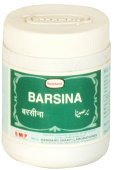Kusta, Kushta: 9 definitions
Introduction:
Kusta means something in Hinduism, Sanskrit, Marathi, Hindi, biology. If you want to know the exact meaning, history, etymology or English translation of this term then check out the descriptions on this page. Add your comment or reference to a book if you want to contribute to this summary article.
In Hinduism
Purana and Itihasa (epic history)
Source: archive.org: Nilamata Purana: a cultural and literary studyKuṣṭa (कुष्ट) refers to Costus specious, forming part of a common diet in ancient Kashmir (Kaśmīra) as mentioned in the Nīlamatapurāṇa.—Kuṣṭa is referred to in connection with the worship of the horses (verse 781). It is known to the Atharvaveda as a remedy for the disease called Takman. Caraka describes it as lekhanīya (thinning the tissues or reducing corpulency) and śukraśodhana (purifying the semen).

The Purana (पुराण, purāṇas) refers to Sanskrit literature preserving ancient India’s vast cultural history, including historical legends, religious ceremonies, various arts and sciences. The eighteen mahapuranas total over 400,000 shlokas (metrical couplets) and date to at least several centuries BCE.
Biology (plants and animals)
Source: Google Books: CRC World Dictionary (Regional names)1) Kushta in India is the name of a plant defined with Cheilocostus speciosus in various botanical sources. This page contains potential references in Ayurveda, modern medicine, and other folk traditions or local practices It has the synonym Costus crispiflorus Stokes (among others).
2) Kushta is also identified with Saussurea costus It has the synonym Aucklandia lappa Decne. (etc.).
Example references for further research on medicinal uses or toxicity (see latin names for full list):
· Repertorium Botanices Systematicae (1843)
· Praelectiones in ordines naturales plantarum (1792)
· Flora of the British West Indian Islands (1864)
· Supplementum Plantarum (1782)
· Phytomedicine (2002)
· Costoideae.
If you are looking for specific details regarding Kushta, for example health benefits, chemical composition, pregnancy safety, diet and recipes, side effects, extract dosage, have a look at these references.

This sections includes definitions from the five kingdoms of living things: Animals, Plants, Fungi, Protists and Monera. It will include both the official binomial nomenclature (scientific names usually in Latin) as well as regional spellings and variants.
Languages of India and abroad
Marathi-English dictionary
Source: DDSA: The Molesworth Marathi and English Dictionarykusta (कुस्त).—a Exhausted and aching from labor--the body.
Source: DDSA: The Aryabhusan school dictionary, Marathi-Englishkuṣṭa (कुष्ट).—n Leprosy. kuṣṭī a Leprous.
Marathi is an Indo-European language having over 70 million native speakers people in (predominantly) Maharashtra India. Marathi, like many other Indo-Aryan languages, evolved from early forms of Prakrit, which itself is a subset of Sanskrit, one of the most ancient languages of the world.
Sanskrit dictionary
Source: Cologne Digital Sanskrit Dictionaries: Monier-Williams Sanskrit-English Dictionary1) Kuṣṭa (कुष्ट):—mf(ā)n. being of a particular colour, [Tāṇḍya-brāhmaṇa xxi, 1, 7.]
2) Kustā (कुस्ता):—See kusita.
[Sanskrit to German]
Sanskrit, also spelled संस्कृतम् (saṃskṛtam), is an ancient language of India commonly seen as the grandmother of the Indo-European language family (even English!). Closely allied with Prakrit and Pali, Sanskrit is more exhaustive in both grammar and terms and has the most extensive collection of literature in the world, greatly surpassing its sister-languages Greek and Latin.
Hindi dictionary
Source: DDSA: A practical Hindi-English dictionary1) Kuśtā (कुश्ता):—(nm) nutritive and retentive calx prepared by chemical processes.
2) Kuṣṭa (कुष्ट):—(nm) leprosy; —[nivāraṇa] eradication of leprosy; —[pīḍita] suffering from leprosy, leprous.
...
Kannada-English dictionary
Source: Alar: Kannada-English corpusKuṣṭa (ಕುಷ್ಟ):—[noun] = ಕುಷ್ಠ [kushtha].
--- OR ---
Kusta (ಕುಸ್ತ):—[adjective] being on, born from, the earth.
Kannada is a Dravidian language (as opposed to the Indo-European language family) mainly spoken in the southwestern region of India.
Nepali dictionary
Source: unoes: Nepali-English DictionaryKusta (कुस्त):—adj. plentiful; abundant;
Nepali is the primary language of the Nepalese people counting almost 20 million native speakers. The country of Nepal is situated in the Himalaya mountain range to the north of India.
See also (Relevant definitions)
Starts with: Kushtacit, Kushtamakushta, Kushtana, Kustaghna, Kustakusti, Kustam, Kustarisu.
Ends with: Akushta, Anekushta, Galitakushta, Hinakushta, Kankushta, Kaukusta, Kukusta, Kushtamakushta, Makushta, Mukushta, Utkushta.
Full-text (+2): Kushtacit, Kustam, Kushti, Kushthavid, Vellaikkushtam, Perunkushtam, Kaushtacitka, Kapalakushtam, Hinakushta, Kalakushtha, Arshangi, Galita, Galit, Ashtamaharoga, Utpala, Pittala, Kusita, Kamsya, Kottha, Tamra.
Relevant text
Search found 7 books and stories containing Kusta, Kushta, Kuṣṭa, Kustā, Kuśtā; (plurals include: Kustas, Kushtas, Kuṣṭas, Kustās, Kuśtās). You can also click to the full overview containing English textual excerpts. Below are direct links for the most relevant articles:
Expiatory Rites in Keralite Tantra (by T. S. Syamkumar)
4.2. Diseases and Expiatory Rites < [Chapter 1 - Expiatory Rites: Concept and Evolution]
Brihad Bhagavatamrita (commentary) (by Śrī Śrīmad Bhaktivedānta Nārāyana Gosvāmī Mahārāja)
Verse 2.1.156 < [Chapter 1 - Vairāgya (renunciation)]
Jivanandana of Anandaraya Makhin (Study) (by G. D. Jayalakshmi)
Act V (Summary) < [Chapter 3 - Summary of the Play Jīvānandana Nāṭaka]
Book Reviews < [July – September, 1989]
The Brahma Purana (by G. P. Bhatt)
Sushruta Samhita, volume 1: Sutrasthana (by Kaviraj Kunja Lal Bhishagratna)
Related products
(+9 more products available)





